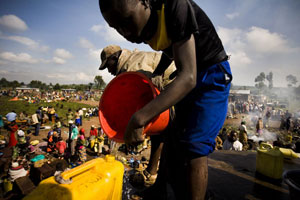MSF teams are continuing to work in Goma and in other towns and villages in the North Kivu region of the Democratic Republic of Congo. The organization remains very concerned about the many people still on the move after fleeing recent fighting. While some displaced people are returning to their places of origin around North Kivu, many of the displaced and local residents continue to be in urgent need of food, clean water, healthcare and basic items like blankets and shelter materials.

© Dominic Nahr / L'Oeil Public
Displaced Congolese near Kibumba, North Kivu, DRC.
Doctors Without Borders/Médecins Sans Frontières (MSF) teams are continuing to work in Goma and in other towns and villages in the North Kivu region of the Democratic Republic of Congo. The organization remains very concerned about the many people still on the move after fleeing recent fighting.
While some displaced people are returning to their places of origin around North Kivu, many of the displaced and local residents continue to be in urgent need of food, clean water, healthcare and basic items like blankets and shelter materials.
The town of Rutshuru was calmer over the weekend. Some 13 people were treated for war wounds at the Rutshuru hospital, and another 50 patients were treated following a truck crash. To assist people displaced by recent fighting in nearby Kiwanja, MSF teams are working at three health centers – in Kiwanja, in Rutshuru town, and at Rutshuru hospital. MSF is the only organization currently working in Rutshuru, with six international and 210 Congolese staff.
At MSF's cholera treatment center in Kibati, just north of Goma, 48 new patients were treated from Friday to Sunday. Some 22 people were transferred to a treatment center in Goma as a precautionary measure. No deaths were reported. Also in Kibati, MSF mobile clinic teams performed around 50 consultations over the weekend and continued providing clean water to displaced people.
Cholera is always a concern in North Kivu; the disease is endemic in parts of the province. Between January and September of this year, MSF treated 1,480 cases of cholera in the area between Goma and Saké, southwest of Kibati. In the Rutshuru area, the site of recent heavy fighting, there were 1,469 cases in the same period, and 851 cases in Mweso and Kitchanga.

© Dominic Nahr / L'Oeil Public
People collect water at a displaced persons camp in Kibati, North Kivu, DRC.
Recent fighting and displacement have increased the risk of cholera. Poor sanitation, lack of clean water, the constant movement of populations, and crowded conditions in displaced camps are all risk factors for the disease.
As usual, MSF is continuing to treat cholera throughout North Kivu, about 60-70 patients per week in Minova, 70 per week in Rutshsuru. Thirteen new patients were treated in Kayna last week. MSF has treated 63 patients at a cholera treatment unit in Goma since November 5, with no deaths reported.
MSF transferred patients from its cholera treatment center in Kiwanja to a treatment unit at Rutshuru hospital, following fighting in the area. A treatment unit in nearby Rubare has treated four to ten new patients per day since the beginning of November.
There have been large movements of displaced people from Kibirizi and Nyanzale to Kanyabayonga and on to Kirumba. MSF estimates that the population of Kirumba has tripled in the past week. In Kanyabayonga, MSF mobile teams performed 1,351 consultations at three health centers over the past week. Today, mobile teams have been dispatched to Kirumba and Kanyabayonga. At the hospital in Kayna, MSF has treated 125 war-wounded patients since October 27.
West of Goma, MSF teams are starting mobile clinics in the Mushake area, and in Karuba village. MSF is providing mental healthcare, basic items, and clean water to displaced people in Shasha camp. Just north of Shasha, in Kirotshe, the organization will provide surgical and emergency support at the local hospital.
The situation was relatively calm in the villages of Kitchanga and Mweso, located north of Goma, where MSF is providing primary and secondary healthcare and running mobile clinics. In Masisi, 80 km northwest of Goma, a six-person MSF international team and 80 Congolese colleagues are providing healthcare at a hospital and health center.
Further east, along the Ugandan border, MSF teams are assessing the condition of thousands of Congolese refugees and displaced people.
MSF is continuing to explore the area, as security conditions permit, identifying people with unmet health needs following recent fighting and displacement. Some 52 international staff are working with MSF in North Kivu now, including doctors, nurses, logisticians, and administrators, among others.





